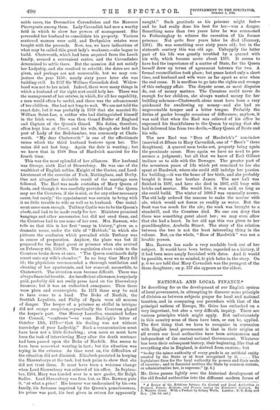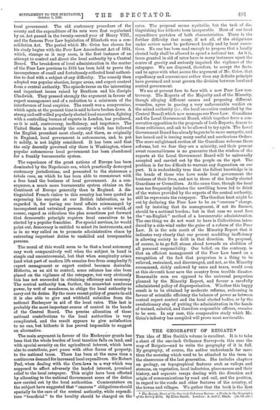NATIONAL AND LOCAL FINANCE.*
Ix describing for us the development of our English system
of local government, in attempting to discover some principle of division as between subjects proper for local and national taxation, and in comparing our procedure with that of the principal nations of Europe, Mr. Grice has embarked on a very important, but also a very difficult, inquiry. There are various principles which might apply. But unfortunately in this country none of them have been, or can be, applied. The first thing that we have to recognise in connexion with English local government is that in their origins at all events our local authorities have been autonomous and independent of the central national Government. Whatever has been their subsequent history, their beginning, like that of everything else in England, is derived from custom ; but " to-day the minor authority of every grade is an artificial entity created by the State or at least recognised by it The legislature fixes for the local authority its powers and their mode of exercise; and in financial matters the State by common statute, or administrative law, is supreme." (p. 6.) Mr. Grice passes lightly over the historical development of the old feudal authorities into the different modern forms of
• d Review of the Relations between the Central England, France, Belgium, and Prussia during the J. Watson Grice. With a Preface by Sidney Webb. Son. [10s. Gil. net.] and Local Authorities in Nineteenth Century. By London : P. S. King and
local government. The old customary procedure of the county and the expenditure of its rate were first regularised by an Act passed in the twenty-second year of Henry VIII., and the famous Poor Law legislation of Elizabeth was a con- solidation Act. The period which Mr. Grice has chosen for his study begins with the Poor Law Amendment Act of 1834, which, strange as it may seem, is the first instance of an attempt to control and direct the local authority by a Central Board. The breakdown of local administration in the matter of the Poor Law previous to 1834 has been held to prove the incompetence of small and fortuitously collected local authori- ties to deal with a subject of any difficulty. The remedy then adopted was popular election, larger areas, and expert control from a central authority. The episode turns on the interesting and important issues raised by Bentham and his disciple Chadwick. They pressed strongly the argument in favour of expert management and of a reduction to a minimum of the interference of local empirics. The result was a compromise, which again at the present time is said to have broken down. A strong and self-willed popularly elected local executive, fighting with a controlling bureau of experts in London, has produced, so it is said, controversy, inefficiency, and impotence. The United States is naturally the country which has followed the English precedent most closely, and there, as originally in England, local government is autonomous, and, to put it mildly, is not highly considered. It has been said that the only decently governed city there is Washington, where popular autonomous local government has been abandoned for a frankly bureaucratic system.
The experience of the great nations of Europe has been dominated by the Napoleonic era, which practically destroyed customary jurisdictions, and presented to the statesman a tabula rasa, on which he has been able to reconstruct with a free hand the business of local government. As a con- sequence, a much more bureaucratic system obtains on the Continent of Europe generally than in England. A dis- tinguished French visitor to this country has been quoted as expressing his surprise at our British infatuation, as he regarded it, for having our local affairs mismanaged by incompetent and untrained persons. Such a critic would, of course, regard as ridiculous the plea sometimes put forward that democratic principle requires local executives to be elected by a popular franchise. For special services, he would point out, democracy is entitled to select its instruments, and is in no way called on to promote administrative chaos by entrusting important duties to unskilled and irresponsible persons.
The moral of this would seem to be that a local autonomy may work comparatively well when the subject in hand is simple and uncontroversial, but that when complexity arises (and what part of modern life remains free from complexity P) expert management or expert control becomes desirable. Hitherto, as an aid to control, some reliance has also been placed on the vigilance of the ratepayer, but very obviously this has not succeeded in. obtaining efficiency and economy. The central authority has, further, the somewhat cumbrous power, by writ of mandamus, to oblige the local authority to carry out its duties. By the more recent policy of grants-in-aid it is also able to give and withhold subsidies from the national Exchequer in aid of the local rates. This last is probably the most important source of control in the hands of the Central Board. The precise allocation of these national contributions to the local authorities is very complicated, and the result appears to give satisfaction to no one, but hitherto it has proved impossible to suggest an alternative.
The main argument in favour of the Exchequer grants has been that the whole burden of local taxation falls on land, and with special severity on the agricultural interest, which have also to contribute, pari passu with other forms of property, to the national taxes. There has been at the same time a continuous demand for increased local expenditure. Sir Robert Peel, when dealing with the Corn-laws in a way which was supposed to affect adversely the landed interest, promised relief to the local ratepayer. This might have been effected by allocating to the national Government some of the duties now carried out by the local authorities. Commentators on the subject have suggested that "onerous " obligations should specially be the care of the central authority, while expendi- ture " beneficial " to the locality should be charged on the
rates. The proposal seems equitable, but the task of dis- tinguishing has hitherto been insuperable. Most of our local expenditure partakes of both characteristics. There is the further difficulty that many, if not all, of the obligations under review must be performed locally and by local execu- tives. No one has been mad enough to propose that a locally elected body shall be allowed to spend a national tax. As it is, taxes granted in aid of rates have in many instances upset the centre of gravity and seriously impaired the vigilance of the ratepayer. We are disposed, therefore, to accept the facts, and to agree with what seems the argument of Mr. Grice, that expediency and convenience rather than any definite principle have governed and must govern the division between local and central government.
We are at present face to face with a new Poor Law con- troversy. The Reports of the Majority and of the Minority, though alleging different causes and proposing different remedies, agree in passing a very unfavourable verdict on the mixed authority (i.e , the local executive controlled by the Central Board) which now manages our Poor Law. Guardians and the Local Government Board, which together form a con- servative opposition to the proposals of both Reports, demur to these criticisms, and ask to be allowed to try again. The Local Government Board has already begun to be more energetic, and has issued and is issuing many useful and meritorious Orders. The more enlightened section of the Guardians welcome these reforms, but we fear they are a minority, and their present sweet reasonableness is no guarantee that the wisdom of the experts at the Local Government Board will be universally accepted and carried out by the people on the spot. The problem is far too difficult to warrant any dogmatism on our part. It is undoubtedly true that the fullest knowledge is in the heads of those who have made local government the business of their lives, and not in those of the locally elected Guardians or Councillors. At the same time, though the local man too frequently imitates the unwilling horse led to drink of the waters provided by the experts of the central authority, still he represents the ratepayer. The Gordian knot might be cut by declaring the Poor Law to be an " onerous " charge, and by insisting that its management, if not its finance, should be a national burden; but in that case we must face the " un-English" method of a bureaucratic administration. The one thing we do not want to have is Collectivism intro- duced by a side-wind under the guise of a reform of the Poor Law. It is the sole merit of the Minority Report that it indicates very clearly that our present muddling inefficiency is allowing society to drift in that direction. Its proposal, of course, is to go full steam ahead towards an abolition of all personal responsibility. Our belief, on the contrary, is that an efficient management of the Poor Law based on a recognition of the fact that pauperism is a thing to be relieved, restrained, and discouraged, and not, as the Minority recommend, richly endowed by rates and taxes, would even at this eleventh hour save the country from terrible disaster. Reasonable men are opposed to the universal pauperism planned by the Minority Report, and favour a carefully administered policy of dispauperisation. Whether this happy result is to be obtained by moderate reforms, redressing in favour of scientific efficiency the balance of power as between central expert control and the local elected bodies, or by the revolutionary step of putting the administration in the hands of trained, salaried, and therefore responsible officers, remains to be seen. In any case, this comparative study which Mr. G rice's industry has compiled will prove most serviceable.



























































 Previous page
Previous page